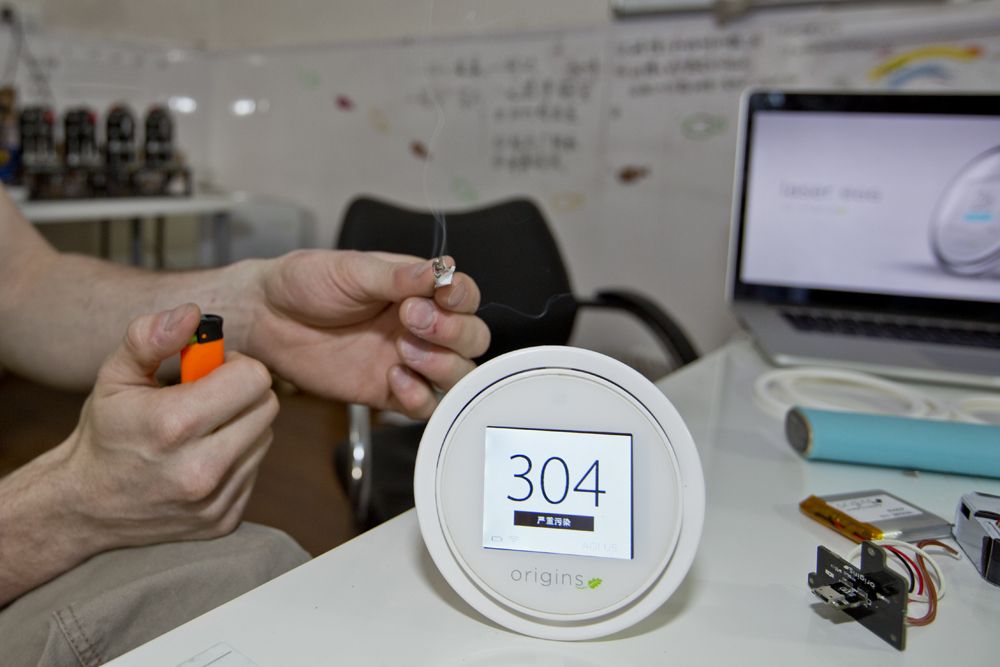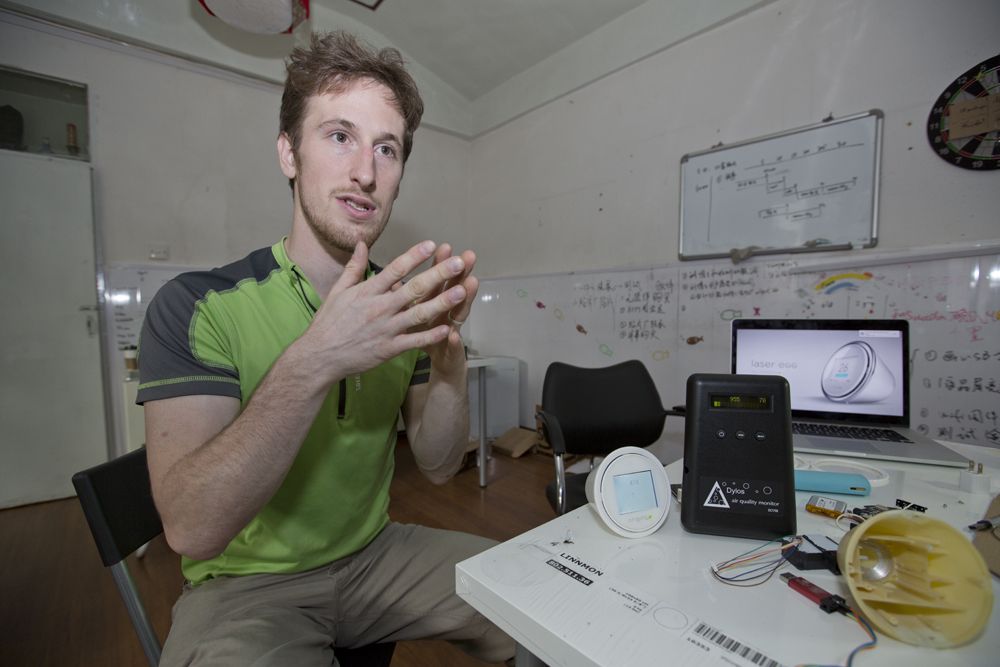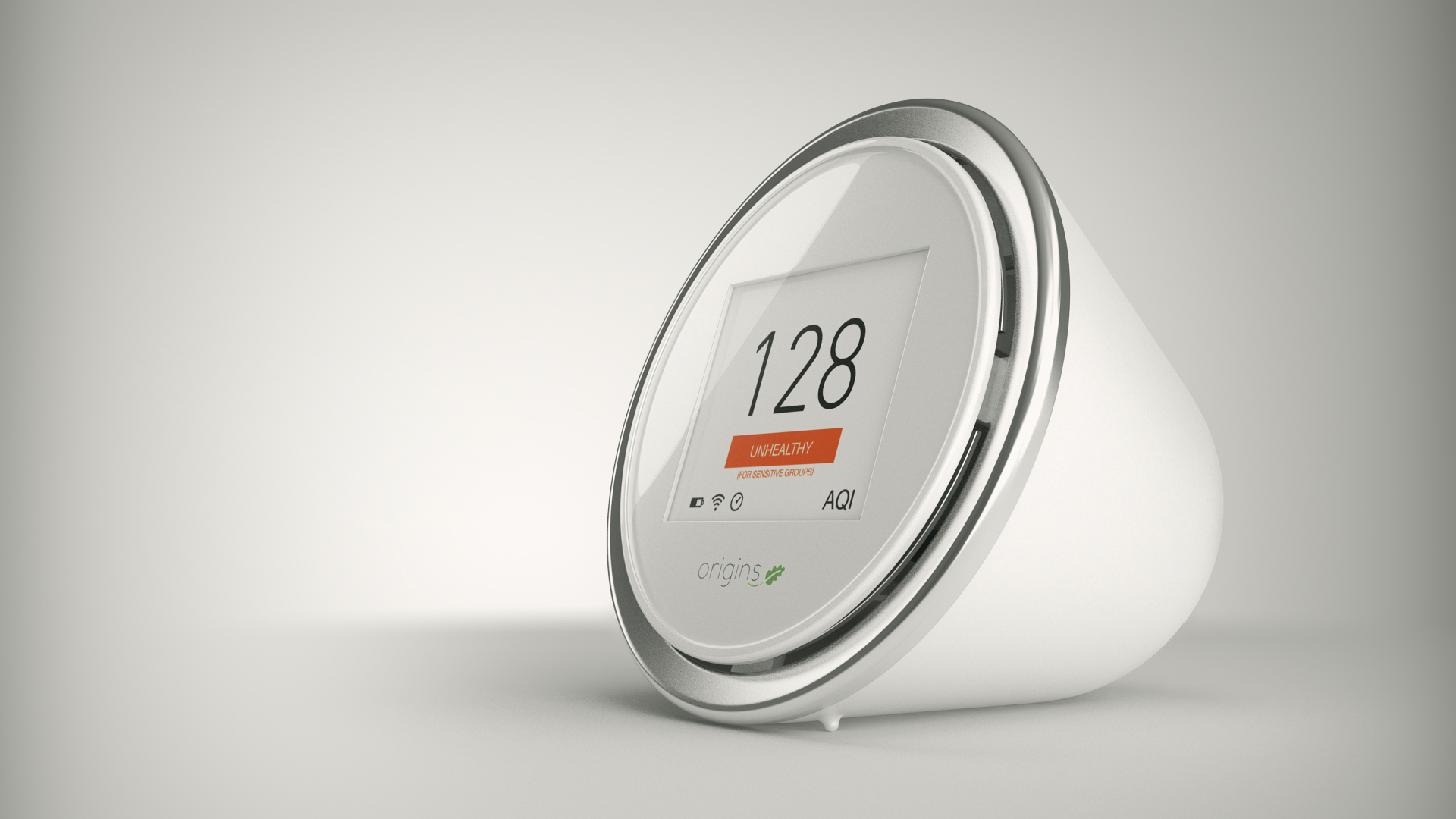Eggstraordinary: Beijing Startup Origins Offers a Palm-Sized Solution to Affordable Air Quality Monitoring

This post is sponsored by Origins, a young technology company based in Beijing that develops cutting edge smart devices designed to help people build and sustain a healthy lifestyle.
Beijing’s air pollution is an expensive problem. The Chinese government has devoted tens of millions of renminbi to air quality monitoring, and the US government has spent USD 25,000 alone for the AQI reader at its Beijing embassy. But for the price of that single American sensor, an entire network of 300 of far more affordable sensors can be purchased, allowing Beijingers to track pollution in real time and know where they can go for a breath of fresh air.
That’s the notion being put forth by Liam Bates, the founder of Origins, a Beijing-based startup that sells highly sensitive air quality monitors for under RMB 400 each, and is readying a mobile app to be launched in early June that can show users the results of those readings.
Dubbed the Laser Egg, this monitor shows AQI levels in the immediate vicinity. The palm-sized dome shaped device looks like an all-white miniature version of R2-D2, and virtually all aspects of design are similarly futuristic. The way it works, however, is brilliantly simple. A little gap at the top of its dome allows air to flow inside. Once the air enters the Egg it comes across an interior laser, causing that beam to refract in several different directions. A sensor rests under the laser, and the amount of refracted light hitting that reader, allows it to determine the size of the pollution particles in the air.
Bates says the most obvious application of such a device would be for people’s homes, allowing them to know when the AQI is high and prompting them to switch on their air purifiers. But he adds that the Laser Egg has further potential in far more ambitious areas. Chief among those initiatives is Origins’ forthcoming smartphone app, which will display the monitor’s readings, warning users of poor air quality and showing them the nearest location with cleaner air.
For now, users can utilize that function by carrying the Laser Egg on their person, but Bates envisions a network where Laser Eggs are positioned in venues citywide, letting users receive air quality updates on their mobile app from the nearest placed monitor. He adds that such a function is extremely useful because air quality levels can vary wildly from place to place and fluctuate greatly from moment to moment, which is a much more complicated reality than what most Beijingers understand about the city’s air pollution.

To demonstrate Bates switches on a Laser Egg at his courtyard office in Beixinqiao. The device gives an AQI reading of 1 on the Chinese scale and 4 on the American scale. He then flicks a lighter under a scrap of paper, and brings the tiny flame next to the monitor. The reading on its display screen immediately jumps from 4 to 330 on the American AQI scale, before settling at 490.
He sums it up thusly: “On a day when the AQI is 700 outside it’s like breathing with this burning piece of paper next to your face.”
That realization surprised Bates, but what shocked him even more is how quickly and vastly air quality levels can change. Since founding Origins and working on the Laser Egg with his team, Bates has frequently corresponded with local municipal officials and even received funding from the Chaoyang government. Some of those officials described how easily their current monitor’s readings can be skewed. For instance the reader in Dongsi, the closest one to the Origins’ office, measures highly elevated levels daily between 6pm and midnight because of all the smoke billowing up from chuan’r vendors during those hours.

“People laughed when officials threatened crackdowns on chuan’r, but it does make a difference,” Bates says. “And if barbecue is having that big of an impact, imagine how that compares to factories.”
Bates argues that if one monitor can be thrown off so easily, then a far more effective alternative would be a network of monitors pinpointing the specific source of pollution in real time, and also the areas where that pollution hasn’t reached. This, of course, saddles governments with a price problem, because of the conventionally hefty cost of such monitors – an issue that can be addressed by Origins’ more affordable Laser Eggs.
This point became abundantly clear when Bates visited the Better Air Quality Conference in Sri Lanka last November. The annual event, organized by Clean Air Asia in conjunction with the World Bank and United Nation’s Environmental Program, is attended by officials from across Asia looking to brainstorm air pollution solutions.
“These governments are pouring millions of dollars a year into pollution monitoring, and after my presentation, many of their officials came up saying: ‘Wow, we don’t need to be paying so much?’” explains Bates. “Low cost air quality monitoring is an entirely new field, and a lot of Asian countries are very interested in it. Despite air pollution being a huge problem in China we’re actually pretty lucky, because the monitoring here is better than in many Western countries. That helps the government know what the problem is, but having access to even more monitors will help us get more of the information we need to truly find a solution.”
Photos courtesy of Origins, Uni You
Related stories :
Comments
New comments are displayed first.Comments
![]() Origins
Submitted by Guest on Sun, 06/07/2015 - 09:23 Permalink
Origins
Submitted by Guest on Sun, 06/07/2015 - 09:23 Permalink
Re: Eggstraordinary: Beijing Startup Origins Offers a Palm...
For those interested in the Laser Egg, check out the Origins website at www.origins-china.com. The Laser Egg is now available for pre-order on Jingdong.com at this link. 
![]() Origins
Submitted by Guest on Sat, 05/30/2015 - 16:16 Permalink
Origins
Submitted by Guest on Sat, 05/30/2015 - 16:16 Permalink
Re: Eggstraordinary: Beijing Startup Origins Offers a Palm...
Thank you for your research, but I assure you, I don't actually know where the Smart Air office is and have never been there. I've had beers with them a few times but have never seen this egg in their office.
P.S. if you look at the designs they actually have very, very little in common. The only real thing is the word egg, which I'm sorry bothers you such.
![]() Origins
Submitted by Guest on Fri, 05/29/2015 - 06:54 Permalink
Origins
Submitted by Guest on Fri, 05/29/2015 - 06:54 Permalink
Re: Eggstraordinary: Beijing Startup Origins Offers a Palm...
Thanks for your reply. Just to clear a few things up:
Eggs are a design as old and efficient as hens, and product designers often use them, especially for high tech products – wired magazine at the end of last year actually wrote about just that. So we aren't the first to use egg designs or even to use them for air-quality devices. Our design was in no way influenced by the air quality egg, our designer has never seen it, even if I myself am familiar with it. In fact the person that chose the name laser egg for us was also completely unaware of the air quality egg's existance 
We're very excited to be part of a bigger worldwide shift to people sharing information, and put that to good use. The Laser Egg is very different from the air quality egg because the technology is completely different, as is what it measures. Laser Egg specialises in monitoring particulate matter, which as far as I can tell the air quality egg doesn't do, so it's a little like comparing apples and oranges! Laser light-scattering & cloud calibration technology provides accuracy not seen before at a price that is unbeatable, afforadble to just about anyone in Beijing wanting to learn more about what they breathe.
We're trying to create a great product to let people take control of their environment, and whether you want to monitor PM2.5 with the laser egg or carbon monoxide with an air quality egg, we'are all happy.
Thanks for your thoughts!
![]() jecabrer
Submitted by Guest on Wed, 05/27/2015 - 22:09 Permalink
jecabrer
Submitted by Guest on Wed, 05/27/2015 - 22:09 Permalink
Re: Eggstraordinary: Beijing Startup Origins Offers a Palm...
I think the idea is superb, you can even in the future integrate data to have it in real time on a map, the design of the app is very important, because if somebody has the device inside a house the device itself cannot know if it is taking data inside or outside. It is true the gases are a completely different story. To measure some pollutants we use devices that cost more than half million USD.
![]() Jerry
Submitted by Guest on Wed, 05/27/2015 - 17:05 Permalink
Jerry
Submitted by Guest on Wed, 05/27/2015 - 17:05 Permalink
Re: Eggstraordinary: Beijing Startup Origins Offers a Palm...
That’s the notion being put forth by Liam Bates, the founder of Origins, a Beijing-based startup that sells highly sensitive air quality monitors for under RMB 400 each, and is readying a mobile app to be launched in early June that can show users the results of those readings.
The price in an earlier version of this article stated that the Laser Egg will sell at RMB 350 each - please note that this has been corrected to under RMB 400 each.
![]() admin
Submitted by Guest on Tue, 05/26/2015 - 13:21 Permalink
admin
Submitted by Guest on Tue, 05/26/2015 - 13:21 Permalink
Re: Eggstraordinary: Beijing Startup Origins Offers a Palm...
In response to jecabrer, you are correct, the technology is not the same. The Laser Egg uses light-scattering via a laser beam to detect particulate matter, and then a calibration via cloud to make it more accurate.
Does your sensor have a fan intake? I've used two light-scattering laser beam -based monitors, one with a fan intake that directs air past the laser, and one that does not. I've found the fan intake one to be a much more reliable measure. I used them side by side and the one without the air intake was not nearly as sensitive as the air intake one, occasionally reporting good air when the other monitor (as well as city reporting and the "look outside and see if it looks like doomsday" approach) indicated the air is quite bad
![]() Jerry
Submitted by Guest on Tue, 05/26/2015 - 13:11 Permalink
Jerry
Submitted by Guest on Tue, 05/26/2015 - 13:11 Permalink
Re: Eggstraordinary: Beijing Startup Origins Offers a Palm...
An earlier version of this article left out the fact that the Better Air Quality Conference was primarily organized by Clean Air Asia. We have since corrected the post. Our apologies for the oversight.
![]() jecabrer
Submitted by Guest on Mon, 05/25/2015 - 22:46 Permalink
jecabrer
Submitted by Guest on Mon, 05/25/2015 - 22:46 Permalink
Re: Eggstraordinary: Beijing Startup Origins Offers a Palm...
I think the equipment that the Us embbasy and The Chinese goverment use is not the same. You can measure the size of particles in that way, but the air pollution is not just about that. There are different compunds generated as a result of photochemical reactions, even the pm 2,5 can be generated for as a result of these reactions.
In fact the products that are in the market can not measure those pollutants. The problem with that is that you have gases that are not effectively filtered by HEPA filters or even activated carbon.
I had a disscution weeks ago with the Director of the division of air pollution of one of the top universties and other scholars, and according to them the filters help to reduce pm 2,5 but it is not effective at all for other pollutants. If somebody is interested in more information just drop me a line.
![]() Arvi89
Submitted by Guest on Mon, 05/25/2015 - 15:25 Permalink
Arvi89
Submitted by Guest on Mon, 05/25/2015 - 15:25 Permalink
Re: Eggstraordinary: Beijing Startup Origins Offers a Palm...
Seems good, I bought a really crappy air monitoring device few months ago (Bpeer) for 500 rmb, if this is good I might buy one then.
Validate your mobile phone number to post comments.




